- Home
- Lissa Evans
Horten's Incredible Illusions Page 8
Horten's Incredible Illusions Read online
Page 8
A huge, shiny green leaf barred his way. He pushed it aside and found himself in an enormous greenhouse full of tropical plants, with creepers dangling from wires above him and huge, perfumed flowers blooming on every side. When he looked down, he could see a muddle of narrow brick paths snaking through the vegetation, crisscrossing each other in a complicated network.
“Which way do I go?” he shouted up to his father.
“To a door near a thing.”
“A thing? What sort of thing?”
“A thing from which clear stuff that you can drink comes out of.”
“Water, you mean? So I’ve got to find a tap? Or a hose?”
“No. You can find things like this in parks. A round shape. Splish, splash. Coins are thrown in.”
“A fountain?”
“Yes.”
Stuart moved cautiously through the vegetation. Butterflies flitted between the flowers; a lizard appeared, paused briefly on a bunch of nearly ripe bananas, and then zipped away again. Somewhere to his left he could hear the tinkle of water. He ducked under a hairy stem, parted a wall of leaves, and found himself beside a stone fountain, with a jet of water shooting upward out of the mouth of a stone dolphin.
On the wall nearby, almost covered with purple flowers, he could just see the outline of a door.
“Through here?”
“Yes. But take care.”
“Why?”
“In the next room there is a … a large beast.”
“Another horse?”
“No. It’s huge and gray with a trunk.”
“You’re not serious?”
Stuart opened the door just a crack and saw a square concrete room, the floor covered with straw. Lying across most of it was an elephant. It appeared to be asleep, though its stomach was rumbling gently, and occasionally it moved its trunk around, sending blasts of warm, grassy breath across the room.
Hardly daring to breathe, Stuart eased his way in and tiptoed forward, straw crackling underfoot. He felt even smaller than usual and incredibly vulnerable. The elephant would only have to roll over and he’d be flattened like a lump of pastry under a rolling pin.
Two metal doors lay ahead, one of them to the left and one to the right.
“You need to go through the door on the right!” shouted his father.
“I can’t,” called Stuart, as loudly as he dared. “There’s an elephant lying in front of it.”
Its vast bottom was actually wedged right up against the correct door.
“The door on the left is a dead end,” said his father. “But if you go back to the plant room you could fetch fruit, which might tempt the beast to move.”
“Bananas!”
It didn’t take Stuart long to locate the bunch where the lizard had been, and he twisted off a handful and found his way back to the next room.
He held one of the bananas near the end of the trunk, and the elephant groped forward sleepily, opening one eye.
“Bananas!” said Stuart, moving it farther away. “Come and get your lovely bananas!”
The elephant hauled itself slowly to its feet, and Stuart threw the bananas into the far corner, then dodged around the side of the lumbering animal.
The door was now clear, and he made a lunge for it.
CHAPTER 19
He stepped into a long room with a cool, green marble floor, and walls hung with large paintings. It took him a moment or two to realize that the only door was the one he’d just walked through.
“This is a dead end,” he shouted up to his father.
“No it’s not—there are … one more than ten ways out.”
“Eleven? Eleven doors? Where?”
“They’re by the square things … I mean, not by … and not square … Oh dear, this is so hard to say.”
“You are doing fine, Dad,” shouted Stuart encouragingly. “Have another try.”
“The things with paint on,” called his father.
“You mean the paintings?”
“Yes. The doors are not in front of them.”
“Behind, then? You mean the doors are behind the paintings? Or do you mean the doors are the paintings?”
He walked up to the nearest one, a sappy portrait of a girl holding a box of chocolates, and yanked at the right-hand side of the frame. It swung straight open, just like a door, to reveal a hole in the wall big enough to step through. And on the other side of it was a candy store, a really fantastic one, every shelf laden with jars, every counter stuffed with fudge and bubble gum and toffee and marshmallow and licorice and chews and lollipops and sourballs …
“Is this the way?” shouted Stuart hopefully.
“No.”
“Oh.” Disappointed, Stuart let the painting swing shut again. “Which one should I go through, then?”
“The one that shows a … a …”
“I might as well try all of them,” said Stuart.
“No, don’t do—”
“It’ll be just as quick.”
He tugged at the frame of the next painting in line, a seascape with a giant squid sticking its head above some improbably huge waves, and the picture smacked open as if on a spring. A torrent of freezing water gushed through the hole, and Stuart, soaked and gasping from the cold, struggled to close it again. A jellyfish flobbed through the gap, followed by a long, orange, sucker-covered tentacle.
“OUT!” shouted Stuart, using all his strength to slam the picture against the intruder. The tentacle withdrew, the door closed, and a sheet of water, green with seaweed, glided along the floor of the gallery, leaving a thin coating of sand behind it.
“Okay,” said Stuart, teeth chattering with shock, “maybe not such a great idea.”
“Are you all right?” called his father.
“Yes, just about.”
He had a sudden memory of assuring his mother that he and his dad would be absolutely fine while she was away, and then he looked at the next painting—an arctic landscape with a snarling polar bear—and decided to leave well enough alone.
“The one you want,” called his father, slowly and carefully, “shows a room at the top of a house. A room in the roof with things in it of all types, shapes, and sorts.”
“An attic,” said Stuart.
He quickly walked around the gallery and soon spotted the painting he needed. It showed a dimly lit room piled high with bags and boxes; an old rocking horse stood in the corner. He pulled at the frame, and the painting swung open to reveal a similar room but one so stuffed with objects that it was actually difficult to see where he could climb in.
He squeezed into a narrow space between a large trunk, a dollhouse, and a stack of hatboxes, and he had a look around, coughing slightly at the dust he’d raised.
“I can’t see a thing,” he shouted. “There’s too much junk in here. Where’s the next door?”
“To your right,” called his father. “To the back of the red rug. Halfway up the wall.”
When Stuart eventually spotted it, he saw that it was more of a hatch than a door—the sort of hatch that in a house would lead to a water tank—but it looked easily wide enough for him to get into. He pulled at the handle.
“It’s locked!” he shouted up at his father.
“Oh.”
“There’s writing on it,” called Stuart, pushing aside a cobweb obscuring the top of the door, and then groaning. “It says, THE KEY IS HIDDEN IN THIS ROOM.” He looked around despairingly.
There was a cardboard box right next to him, and he lifted the flaps at the top and glanced at the jumbled contents—some old lightbulbs, odd tools, nails, tangled string, a loose pack of cards, a clock, a bag of curtain fittings: it would take him twenty minutes to go through this alone, and the room had forty or fifty other boxes, suitcases, trash bags, and pieces of furniture. There were a million places to hide a key.
He turned to pull at the door again, just in case he could wrench it open by force. As he grabbed the handle, the rest of the cobweb fell down.
“There’s m
ore writing,” shouted Stuart, frowning at the words in front of him, “but I don’t know what any of it means. And you can’t say anything longer than a syllable, so you won’t be able to explain it to me.”
“I can try,” replied his father. “Read it aloud.”
“Okay. It’s all a bit weird…. I wonder if it’s a code? It says, CIPHER IN MAZARINE COFFRET NIGH PIGMEAN DEMESNE.”
There was a short pause, and then his father laughed.
“What?” asked Stuart.
“It’s not a code. The words are rare and old, just the sort I like best. They mean: The key is in a small blue box near the doll house.”
“Really?” Stuart scrambled to get it. The blue box rattled as soon as he picked it up, and he took out the key.
“And the next room is the last,” shouted his father triumphantly.
Stuart turned the key, opened the hatch, and looked through. Everything was gray: a long, very narrow room, like a corridor, with gray walls, a smooth gray floor … and a gray ceiling made of a billowing fabric that bunched and shuddered in the breeze.
“What a strange thing,” called his father, his voice muffled by the cloth.
“I know,” said Stuart. “It’s got a ceiling.” At the very far end of the room was another door, and he could see a heavy bolt near the top of it. He wondered instantly if he’d actually be able to reach the bolt—though he could always come back to the attic room and fetch a box to stand on.
He wriggled through the hatch and dropped to the floor. It felt rubbery and slightly springy. He started to walk toward the far door, and he’d only gone a few steps when the whole floor began to move backward—smoothly, like a conveyor belt. Stuart quickened his pace, but the floor speeded up as well. He broke into a run, and the floor whizzed along too, keeping him in exactly the same place, as if he were on a giant treadmill. Frustrated, he slowed to a halt again, and the floor stopped moving too. He was no nearer the far door than when he’d started.
“I can’t get there!” he shouted. “The floor won’t let me.”
His dad said something in reply, but it was difficult to hear through the cloth ceiling.
“What?” called Stuart.
“Ape bars.”
“What?“
“Bars for apes. On top of the cloth.”
“I don’t understand. Shout louder.”
“PULL THE CLOTH DOWN.”
Stuart walked back, hoisted himself up into the hatch again, and reached upwards. He could just snag the cloth with his fingers.
“PULL IT DOWN?” he asked.
“YES!”
Stuart gave it a yank. The whole ceiling ripped softly away and fell in gentle folds onto the floor. And above it was a set of monkey bars, bridging the room from one end to the other. Stuart shouted in surprise, and then looked up at where his father stood, practically directly above him now.
“Did you say there are steps down the inside of the tower?” Stuart called out.
“Yes.”
“See you at the bottom then, Dad.” Gripping the first rung, Stuart began to swing himself along—being good at the monkey bars was one of the few advantages of being small and light. It only took him half a minute to get to the far end, and now he could see why the bolt was so high up—he could reach it from above, with one hand. He slid it loose, and at the center of the gray door, a purple O suddenly appeared.
Stuart gave the door a kick. It opened inward but only an inch or so. He gave it a second, much harder kick; it shot open and hit something that sounded horribly like someone’s head.
There was a groan and a nasty thud.
“Dad?” called Stuart, horrified. “Are you all right?”
CHAPTER 20
“Mr. Horten?” said another voice. “Are you all right?”
Stuart looked around, and realized that in that fraction of a second he’d come back to the museum again, and April was peering concernedly over his shoulder.
He looked back and saw his father lying on the floor beside the Fan of Fantasticness, his eyes open and a red mark on his forehead.
“Are you okay?” asked Stuart, bobbing down beside him.
“That was so odd,” said his father. “So odd …”
A cold hand seemed to grip Stuart’s heart. Had his father’s speech changed forever? “What was odd, Dad?” he asked hoarsely.
“It appears I hallucinated that I was solely able to communicate in monosyllables, which led to considerable bafflement in my attempts to disseminate information to you. However, as I appear to have sustained a frontal cranial contusion, I was presumably experiencing a series of hypnagogic images which have now effectively dissipated.”
The cold hand let go of Stuart’s heart again; his father was obviously going to be absolutely fine.
“You’re right,” said Stuart. “You just got a bit of a knock when the fan folded up.”
“The Fan of Fantasticness?” asked his father, getting slowly to his feet.
“You told me that fantasticness isn’t a real word. We should call it the Fan of Fantasticality.”
“But I thought you wished me to favor a more curtailed approach to vocabulary?”
“Shorter words, you mean?”
“Yes.”
“No,” said Stuart firmly, “Definitely not. I want you to stick to the usual mad long stuff that I can’t understand at all.”
April had been watching the conversation, puzzled. “What’s been going on?” she asked.
Stuart grabbed the magic star from its socket and beckoned her over to a corner.
“Dad used the star,” he whispered, holding it up so she could see that there were only three spokes left.
“What?“
“Accidentally. And I caught hold of him and managed to go along too. Sorry, it was an accident—it happened when we were trying to fold the fan. And you were right about how it’s done.”
He could see her struggling with disappointment.
“So what was the adventure like?” she asked, a bit glumly.
He thought for a moment; it was hard to describe it in the kind of words that he normally used. “Peculiar, unpredictable, frustrating, extraordinary,” he said.
“You’re sounding like your dad,” remarked April, managing a small smile.
The door opened with a bang, and Rod Felton strode in.
“Splendid news,” he said in his usual enthusiastic bellow. “The TV people are interested. Midlands at Midday wants to do a live feature on our special magical exhibition, and they’re sending a camera crew around in the morning. Can you be here at nine sharp?” he asked, glancing from Stuart to April.
They nodded, and then looked at each other.
“We’re going to be famous!” whispered April, grinning with excitement. “I must tell May and June,” she added. “They can come along and report on it for the Beech Road Guardian.”
“And could you be here too?” the curator asked Stuart’s father. “I’ve had a rather brilliant idea about how to drum up advance interest in the Roman Beeton exhibition as well, and I need someone who can tell a strigil from a hypocaust.” He laughed as if he’d just told a joke, and Stuart’s father laughed as if he’d just heard one.
“I should be honored to assume such a role,” said Stuart’s father, and Rod Felton bounced happily out of the room again.
“Actually,” said April, “I’ve got another invitation. My mom wants to know if you two want to come over for a barbecue this evening. Dad’s cooking steaks.”
While April’s dad filled the backyard with smoke and May and June chopped up vegetables for coleslaw, April dragged Stuart into a corner by the shed and made him tell her every detail of the Amazing Maze.
“So the letters so far are S, W, and O,” she said, and chewed her lip for a moment or two. “And what about the mysterious phone call? You haven’t told me about that yet, either.”
“Oh, right …” Stuart hesitated. The thought of that strange and tempting conversation made him feel u
ncomfortable. “It was from a very old lady called Miss Edie who wants to buy Great-Uncle Tony’s tricks.”
“Why?”
“Well, that’s the odd thing. She said she had promised her grandmother, and that her grandmother had told her that Great-Uncle Tony hid a will in one of the tricks, leaving everything to the person who finds it, and—”
“Hang on,” interrupted April, flapping her hands. “You said that this Miss Edie was really old.”
“Yes.”
“So when did her grandmother die?”
“Eighty-five years ago.”
“So before Great-Uncle Tony was even born?”
“Yes.”
There was a long pause.
“Did she seem a bit crazy?” asked April tentatively.
“Not especially,” said Stuart.
“Okay, well, let’s ignore the grandma thing for the time being, it’s just too strange. This hidden will, though—presumably it’s the thing that all the letter clues are taking us toward. The note said: Lead you to my W—didn’t it? And I bet Miss Edie wants you to find it because then you’d be able to prove the tricks are yours, and you’d be free to sell them to her. But you wouldn’t do that, would you?”
“Wouldn’t do what?” asked Stuart, still flabbergasted (as ever) by how quick and clever April was.
She spoke again, her voice confident. “You wouldn’t sell your great-uncle’s fantastic legacy—which you had to work so hard to find—to some woman you’d never met just because she offered you a ton of money?”
Stuart didn’t answer. In his head he could still hear Miss Edie’s crackly, insistent voice: “‘Being rich means you can get anything you want. What do you want, Stuart?’“
Over by the barbecue, Mr. Kingley was forking the steaks onto plates, and Stuart’s father was setting up a table and chairs. May (or June) lugged a bowl of salad from the house, and June (or May) started pouring out drinks.
“Grub’s up,” shouted Mr. Kingley.
Stuart got to his feet, his stomach rumbling.
“I’ve just thought of something quite funny,” said April, following him up the yard. “What if I found the will? Then the tricks would belong to me!”
Grinning, she went to sit down, but Stuart remained standing, and he wasn’t grinning at all. Though part of him knew that April was only joking, another part was seething with panic and jealousy. They’re mine, he thought, not April’s. They’re mine to keep. And mine to sell.

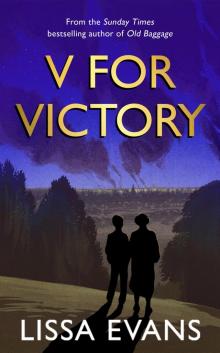 V for Victory
V for Victory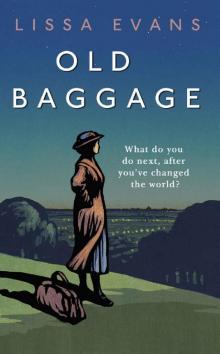 Old Baggage
Old Baggage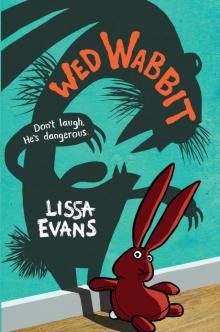 Wed Wabbit
Wed Wabbit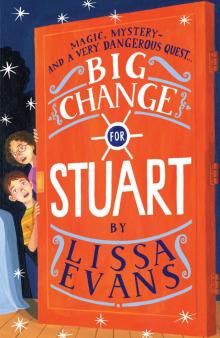 Big Change for Stuart
Big Change for Stuart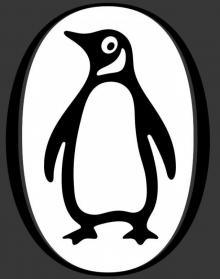 Spencer's List
Spencer's List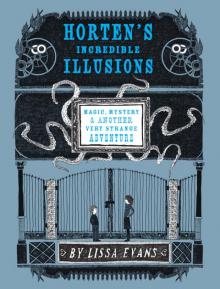 Horten's Incredible Illusions
Horten's Incredible Illusions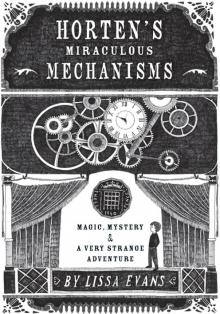 Horten's Miraculous Mechanisms
Horten's Miraculous Mechanisms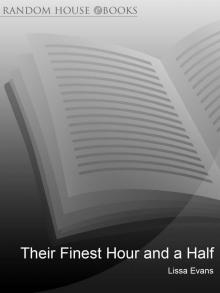 Their Finest Hour and a Half
Their Finest Hour and a Half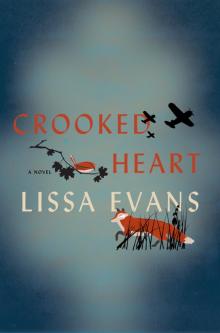 Crooked Heart
Crooked Heart